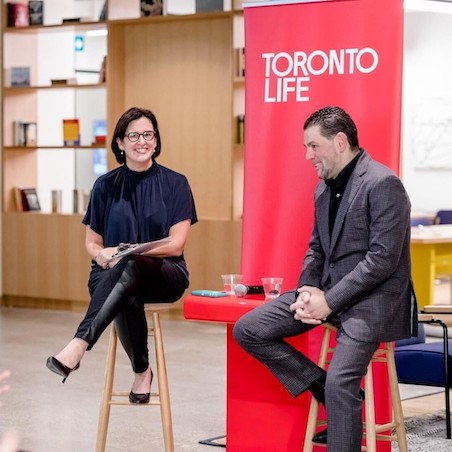Sarah Fulford
Editor-in-Chief, Maclean's
Bachelor of Arts (Hons), 1996
One of the things I found at King’s was a sense of belonging and that's a really powerful thing in a person's life.
Sarah Fulford likes to really figure things out.
It’s part of why she’s recently been asked to manage Maclean’s, one of Canada’s most widely circulated news magazines. It also explains her decision to attend the University of King’s College.
King’s caught Sarah’s attention when she read Linda Frum’s Guide to Canadian Universities, which made campus life sound “cinematic, literary, high minded.” Then, Sarah says, a cool older friend from high school came to King’s, “And I wanted to follow in her footsteps.” She then read the King’s viewbook and “The [Foundation Year Program] sounded fantastic, exciting and ambitious.” She says that’s how she knew “King’s was a place where people had real ambitions for their lives and took themselves and their futures quite seriously.”
It’s similar to how Sarah feels being the new editor-in-chief of Maclean’s. Over the past 100 years, Maclean’s, she believes, has helped Canadians to understand who they are and where they fit globally. She adds, “Playing a role in the country’s self-understanding, in the biggest conversations of the nation, that’s exciting to me.”
For 14 years, Sarah’s been at Toronto Life, helping to bring the publication into the digital age. At times, it required experimentation. “There was no roadmap for publishing digitally and none of us had experience. We just tried stuff and measured our efforts and eventually we learned the rules of digital storytelling,” she explains. At first, the perfectionist in her was cautious, but in time she found it a “marvellously creative space” to work.
The digital age helped Sarah to answer questions with metrics. She says, “One of the happy surprises of my career is discovering your best work often resonates.”
The internet, she says, has helped do away with an old-style, cold and clinical journalism, adding readers want stories that are intimate and emotional. “You can do really important journalism that changes policy and reframes the conversation and delves into hugely pressing issues, as long as it’s told really well, has a very good story and is compelling.”
Sarah credits King’s with showing her the rudimentary elements of good writing. “I believe strongly that having to write an essay every two weeks in the Foundation Year Program taught me how to read, write and think. Full-stop.”
And King’s made an impact in other ways.
Sarah observed the seriousness with which some of the students, students who she says were colloquially known as the ‘God Squad,’ responded to the Chapel. A secular Jew from a large multicultural city, Sarah was inspired by “their intensity and inquisitiveness about tradition.” Further, studying ancient civilizations alerted her to her deficit of knowledge about the Jewish tradition. She says it propelled her to a Yeshiva in Jerusalem where for one year, she says, “I had a very intense encounter with ancient Jewish texts in order to fill the gap that I hadn’t even recognized was there until I went to King’s.”
There’s one more thing she found at King’s.
Not long after a fellow student gave the play she directed a negative review in The Watch, she encountered him at a cocktail party. She was at the party to play the cello and yet found herself in conversation with her critic. His disposition toward her changed. Her critic was Stephen Marche, BA(Hons)’97, who has gone on to become a recognized Canadian novelist, essayist, and cultural commentator. Sarah and Stephen have been married for 20 years now.
